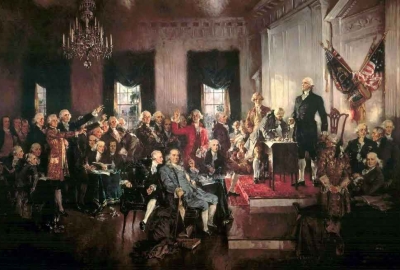International Day of Democracy
The International Day of Democracy is globally celebrated every year on the 15th of September. It was established by the United Nations General Assembly in 2007 and first celebrated in 2008 to honor, celebrate and support the basic values of democracy so that they are, in the words of the UN Resolution, “enjoyed by everyone, everywhere.” This year marks the 15th anniversary of International Democracy Day.
The essence of democracy is best captured by perhaps the best-known speech in the world in any language given at the 1863 dedication of the Gettysburg National Cemetery by our 16th President, Abraham Lincoln, where he famously extolled democracy as “government of the people, by the people, for the people.” President Lincoln was asked to give “a few appropriate remarks” at the dedication.
While the International Day of Democracy was first celebrated 15 years ago, this year also commemorates the 60th anniversary of an unprecedented event in American history in which we recognized the importance of defending democracy, not just for the many, but for all. By the authority of the 88th Congress, our 35th President, John F. Kennedy, proudly proclaimed in 1963, Sir Winston S. Churchill an Honorary Citizen of the United States of America for his historic role and unwavering commitment in defending democracy across Nazi-occupied Europe and throughout the world during its darkest hour and greatest global challenge.
Honorary Citizenship of the United States is granted to a foreigner of only exceptional merit. Churchill was the first of only eight (8) persons made an Honorary Citizen of the United States and one of only two (2) recipients to receive this distinction during his lifetime. (Saint Teresa of Calcutta, better known as Mother Teresa, was so honored in 1996).
In conferring this rare honor to Churchill, President Kennedy (himself a great admirer of Churchill) echoed the eloquent words of the legendary American broadcaster, Edward R. Murrow, praising Churchill for having “mobilized the English language and sent it into battle.” This was at a time when Nazi tyranny was at the zenith of its power and had overrun the whole of Western Europe, and when democracy was most imperiled.
Resolute leadership, indomitable courage and inspirational literary talent have scarcely been better exemplified than by Churchill, who tirelessly defended democracy and stalwartly led his country through its greatest trial and in its finest hour four score and three years ago (1940) when the future of the free world hung in the balance. Never was so much owed by so many to one individual.
The bestowing of Honorary Citizenship of the United States upon Churchill was not only unprecedented at the time, but it was also the occasion of Churchill’s last public speech. Churchill’s failing health at the age of 88 prevented him from traveling to Washington, D.C. to accept this honor in person. Instead, he watched the ceremony on television from his London home. His only son, Randolph, accepted the award on his behalf and he delivered for Churchill his final public speech at the ceremony held in the most iconic gardens in America, the Rose Garden at the White House, with his 22-year-old grandson looking on.
In his speech accepting the award, directed to the President, Churchill said, in part: “I have received many kindnesses from the United States of America, but the honour which you now accord me is without parallel. I accept it with deep gratitude and affection . . . . I would ask you to accept yourself, and to convey to both Houses of Congress, and through them to the American people, my solemn and heartfelt thanks for this unique distinction, which will always be proudly remembered by my descendants.” (Churchill was not one who ever wrote a dull sentence.)
Eleven score and fourteen years ago (1789), our Founding Fathers established a unique form of government of, by, and for the people enshrined in our Constitution. On this International Democracy Day, we are called upon to renew our commitment to celebrate, defend and promote the core tenets of democracy and our long-held and enduring democratic traditions.
Disclaimer: This summary is provided for educational and informational purposes only and is not legal advice. Any specific questions about these topics should be directed to attorney Mark C. O’Connor.
© 2023 by Rich May, P.C. and Mark C. O’Connor. All rights reserved.


